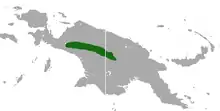Seri's tree-kangaroo
Seri's tree-kangaroo[3] (Dendrolagus stellarum) is a species of tree-kangaroo native and endemic to montane forests of west-central New Guinea. Seri's tree-kangaroo was originally considered to be a subspecies of Dendrolagus dorianus, but was elevated to species in 2005 by Groves.[4][5]
| Seri's tree-kangaroo | |
|---|---|
| Scientific classification | |
| Kingdom: | Animalia |
| Phylum: | Chordata |
| Class: | Mammalia |
| Infraclass: | Marsupialia |
| Order: | Diprotodontia |
| Family: | Macropodidae |
| Genus: | Dendrolagus |
| Species: | D. stellarum |
| Binomial name | |
| Dendrolagus stellarum | |
 | |
| Seri's tree-kangaroo range | |
Distribution
Its elevational distribution is rather different from that of the other related species, in that it descends no lower than about 2600 metres. The forest becomes less mossy and more diverse, below this elevation. It is not clear why it is restricted to such high elevations, unlike the closely related Ifola (Dendrolagus notatus) which descends to much lower elevations.[6]
Description
"Seri's tree-kangaroo is one of the most attractive members of the Doria's complex. Very young animals have a bright yellow tail and a very dark body, but as they age the tail darkens and the distinctive silvery tipping develops on the limbs. The heavily silver-frosted coat colour of adults blends extraordinarily well with the epiphytic mosses and lichens of the upper montane forest."[7]
References
- Leary, T.; Seri, L.; Flannery, T.; Wright, D.; Hamilton, S.; Helgen, K.; Singadan, R.; Menzies, J.; Allison, A.; James, R.; et al. (2008). "Dendrolagus stellarum". IUCN Red List of Threatened Species. 2008. Retrieved 17 May 2010.CS1 maint: ref=harv (link)
- http://www.eol.org/pages/311965
- Econinjas.com
- Groves, C. P. Order Diprotodontia. In: WILSON, D. E.; REEDER, D. M. (Eds.). Mammal Species of the World: A Taxonomic and Geographic Reference. 3. ed Baltimore: Johns Hopkins University Press, 2005. v. 1, p. 43-70.
- Lamoreux, J. & Hilton-Taylor, C. (Global Mammal Assessment Team) 2008. Dendrolagus stellarum. In: IUCN 2010. IUCN Red List of Threatened Species. Versione 2010.1
- http://www.papuaweb.org/gb/ref/flannery-1996/122-123.html
- http://www.eol.org/pages/311965
- http://animaldiversity.ummz.umich.edu/site/accounts/classification/Dendrolagus_stellarum.html
- D.E. Wilson; D.M. Reeder, Dendrolagus stellarum. In Mammal Species of the World. A Taxonomic and Geographic Reference. 3a edizione, Johns Hopkins University Press, 2005. ISBN 0-8018-8221-4
